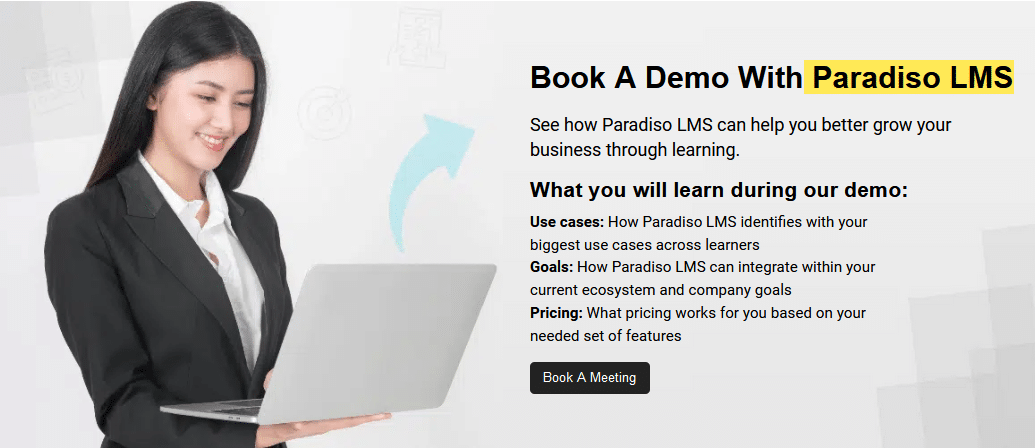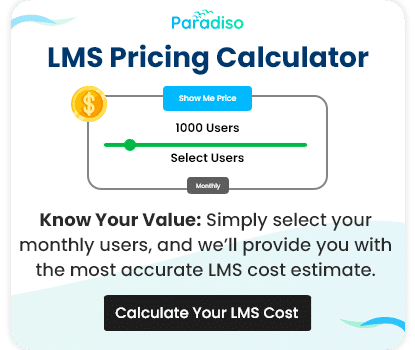Creating a culture where employees constantly learn and grow is more important than ever. As an HR professional, you’re at the forefront of this effort, and having the right tools can make all the difference. Enter the HR Learning Management System (HR LMS)—a game-changer for organizations looking to enhance their training programs and foster continuous development. This guide will walk you through why an HR LMS is essential, showcase some top examples, and share best practices to help you build a thriving culture of growth within your company.

HR Learning management system: A guide for HR professionals
Why is a Learning Management System Important to HR Professionals?
A Learning Management System for HR Training is a powerful tool that supports your organization’s training and development initiatives and provides analytics and reporting that helps HR professionals to track employee progress and identify areas for improvement. Here’s why it’s so crucial:
Streamlined Training Processes
Managing training programs manually can be a headache—think endless paperwork, tracking course completions, and generating reports. An HR Learning Management System automates these tasks, making it easier to organize, track, and deliver training programs efficiently. This means you can spend less time on administration and more time on strategic initiatives.
Personalized Employee Development
Every employee has unique learning needs and career goals. An HR LMS allows you to create personalized learning paths that align with both individual aspirations and organizational objectives. This tailored approach not only boosts employee engagement but also improves retention rates by showing your team that you’re invested in their growth.
Data-Driven Insights
With an HR Learning Management System, you gain access to valuable data and analytics. You can track employee performance, monitor course completion rates, and identify skill gaps. These insights help you make informed decisions about your training programs and ensure they’re meeting the needs of your workforce.
Compliance and Standardization
In many industries, compliance training is mandatory. An HR LMS ensures that all employees complete required training on time and that records are accurately maintained. This not only helps you stay compliant with regulations but also reduces the risk of costly fines and legal issues.
Empower your workforce with continuous learning through our HR Learning Management System. Talk to an expert today to elevate your organization’s growth strategy!
5 Best Learning Management System Examples
Choosing the right LMS for HR can significantly impact your training outcomes. The ideal system should align with your organization’s specific needs and goals, enhancing employee engagement and knowledge retention.
Here are five top examples to consider:
1. Paradiso LMS
Paradiso LMS is a versatile and user-friendly platform designed to meet diverse organizational needs. Known for its intuitive interface and robust feature set, Paradiso LMS offers comprehensive modules for course creation, assessment, and reporting. Its scalability makes it suitable for both small businesses and large enterprises seeking a flexible HR LMS solution. Organizations using Paradiso LMS have reported enhanced training efficiency and higher employee satisfaction, making it a popular choice for fostering continuous learning.
2. TalentLMS
TalentLMS is perfect for small to medium-sized businesses looking for a straightforward yet powerful LMS for HR. It offers customizable course creation, interactive assessments, and seamless integration with various HR tools. Its easy-to-navigate interface ensures that both administrators and learners can use the system with minimal training, making it a versatile option for diverse training needs.
3. Cornerstone OnDemand
Cornerstone OnDemand stands out with its extensive library of courses and advanced analytics. This platform focuses on employee engagement and development, making it ideal for organizations that prioritize talent growth. The robust reporting capabilities help HR professionals track and measure the effectiveness of their training programs, ensuring that learning initiatives align with business goals.
4. Docebo
Docebo offers an AI-powered LMS that enhances the learning experience through personalized content recommendations and automated administrative tasks. Its flexible architecture allows for easy customization to meet specific organizational needs. Docebo’s strong reporting features help HR teams optimize training effectiveness, making it a top choice for businesses looking to leverage AI in their training programs.
5. Absorb LMS
Absorb LMS is known for its intuitive interface and powerful features, including mobile learning, eCommerce integration, and comprehensive reporting. It’s ideal for organizations that want to deliver engaging and accessible training programs. Absorb LMS’s scalability makes it a reliable option for growing businesses aiming to expand their training initiatives without compromising on quality.
Transform your workplace with a powerful HR Learning Management System. Speak with an expert now to build a culture of growth and success!
5 Best Practices for Leveraging LMS Software in Your HR Department
To get the most out of an HR Learning Management System, consider these best practices:
- Align LMS with Business Goals: Ensure your LMS supports your organization’s broader objectives. Whether you aim to improve employee performance, foster leadership development, or ensure compliance, your LMS should be tailored to meet these specific goals. Aligning your LMS with business strategies ensures that your training initiatives contribute directly to organizational success.
- Promote User Engagement: Encourage employees to actively participate in training programs by making the learning experience interactive and engaging. Use multimedia content, gamification elements, and regular feedback to keep learners motivated. An engaging LMS fosters a positive learning environment, enhancing knowledge retention and application.
- Provide Continuous Support: Offer ongoing support and resources to help employees navigate the LMS effectively. This includes training sessions, user guides, and a dedicated support team to address any technical issues or questions. Continuous support ensures that employees can fully leverage the LMS’s capabilities, maximizing your investment.
- Utilize Data Analytics: Leverage the data and analytics provided by your HR LMS to monitor training progress and measure outcomes. Use these insights to refine your training programs, identify areas for improvement, and demonstrate the value of training initiatives to stakeholders. Data-driven decision-making enhances the effectiveness and efficiency of your training efforts.
- Foster a Learning Culture: Cultivate an organizational culture that values continuous learning and development. Encourage managers to support their teams in pursuing training opportunities and recognize employees who actively engage in their professional growth. A strong learning culture promotes employee engagement, satisfaction, and retention, driving overall organizational success.
Build a Culture of Growth with HR Learning Management Systems
Implementing an HR Learning Management System goes beyond adopting new technology—it’s about embedding a culture of growth and development within your organization. Here’s how an HR LMS can help build this culture:
Empower Employees
An HR LMS empowers employees by providing them with the tools and resources needed to take charge of their own development. This autonomy fosters a sense of ownership and responsibility, driving individuals to continuously improve their skills and knowledge.
Enhance Collaboration
Many HR LMS platforms offer collaborative features such as discussion forums, peer reviews, and social learning tools. These features encourage knowledge sharing and teamwork, creating a more cohesive and supportive work environment. Enhanced collaboration leads to innovative solutions and a stronger sense of community within the organization.
Recognize and Reward Learning
Integrate your LMS with your performance management system to recognize and reward employees who actively engage in learning. Whether through certifications, badges, or other incentives, acknowledging their efforts reinforces the importance of continuous development. Recognition and rewards motivate employees to pursue further learning opportunities, fostering a proactive approach to professional growth.
Adapt to Change
In today’s fast-paced business world, the ability to adapt to change is crucial. An HR LMS enables your organization to quickly respond to emerging trends and skill requirements, ensuring that your workforce remains competitive and resilient. By staying ahead of industry developments, your organization can maintain its edge and drive sustained success.
Conclusion
Investing in an HR Learning Management System is a strategic move that can significantly enhance your organization’s leadership and management capabilities. By streamlining training processes, personalizing employee development, and providing actionable insights, an HR LMS fosters a culture of continuous growth and development. As businesses strive to stay competitive in an ever-changing landscape, leveraging the power of an HR Learning Management System will be essential in cultivating a skilled, engaged, and resilient workforce.
HR Learning Management Systems FAQs
1. What is an HR Learning Management System?
An HR Learning Management System is a software platform designed to manage and deliver training and development programs within an organization. It helps HR professionals streamline training processes, personalize employee development, and track training effectiveness.
2. How does an LMS for HR benefit organizations?
An LMS for HR offers numerous benefits, including streamlined training administration, personalized learning paths, data-driven insights, and enhanced compliance management. It also fosters a culture of continuous learning and development, leading to increased employee engagement and retention.
3. Can an HR LMS integrate with other HR tools?
Yes, most HR LMS platforms are designed to integrate seamlessly with other HR tools such as payroll systems, performance management software, and employee engagement platforms. This integration enhances data flow and provides a unified view of employee development.
4. What features should I look for in an HR LMS?
When selecting an HR LMS, consider features such as ease of use, scalability, customizable course creation, interactive learning tools, robust reporting and analytics, mobile accessibility, and integration capabilities with existing systems.
5. How can an HR LMS support employee upskilling and reskilling?
An HR LMS supports upskilling and reskilling by offering personalized learning paths, interactive training modules, and access to a wide range of courses. It enables employees to acquire new skills and adapt to changing job requirements, ensuring they remain valuable assets to the organization.










